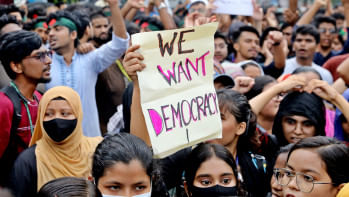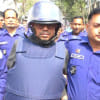Political literacy needed now more than ever

Bangladesh's political system, which was defined by a back-and-forth "game of power," has long frustrated its people. After gaining independence in 1971, two dominant political forces have fought each other for control of the country: the Awami League (AL) and the Bangladesh Nationalist Party (BNP).
The alternating rule of these parties has deeply shaped the political culture of Bangladesh, leading to a form of governance that has often prioritised party interests over the welfare of the people. The people of Bangladesh seemed to be at an impasse as a result of the rotation of power between these two parties and the inability to forge a political solution based on inclusion and national interest.
Through a military takeover, General Hussain Muhammad Ershad established martial law, resulting in almost 10 years of totalitarian tyranny. Although Ershad's government made an effort to present itself as a rival to the BNP and the AL, it was mostly viewed as just another example of military rule over a nation with a volatile political system. The people's desire for freedom posed a grave risk.
The failure to achieve a new political settlement after the 1947 partition, the Liberation War of 1971, and even the fall of Ershad in 1990, has left the people of Bangladesh yearning for change. While the mass movements that shaped the nation have brought about significant moments of political transformation, they have not led to a new, inclusive political framework that transcends the interests of political elites.
Many believed that a new era of democratic government would begin in 1990 with the end of the military dictatorship. But the BNP and AL's hegemony has prevented other political forces from rising to the surface. Political reforms aimed at reducing the influence of money in politics, curbing political violence, and creating space for new political movements have been slow to materialise.
The anti-discrimination movement of 2024 represents a turning point in the country's history and the voice of a people eager for change. This movement led by students and backed by the wider public, came as a response to more serious structural problems including corruption, authoritarianism, and a lack of political responsibility, rather than merely a reaction to local complaints. It is crucial to consider how political knowledge and education might help to maintain the movement's spirit in the wake of such a profoundly changing event.
The process by which people get the information, abilities, and mindset required to comprehend and interact with political institutions and concerns is referred to as political literacy. It encompasses not just official educational environments but also impromptu conversations and involvement in social movements.
In Bangladesh, a nation steeped in political engagement spanning from the Language Movement to the Liberation War, political education has consistently been essential in moulding the ethos of the people.
But political education has been declining in the last few decades. The public's capacity to hold politicians responsible has been undermined by disenchantment with corrupt practices, a lack of political literacy, and inadequate civic education in schools, all of which have contributed to disengagement from politics. This left a void that bred political division and authoritarian inclinations, until giving rise to the anti-discrimination movement. This movement demonstrated the strength of the people's unity, but it also brought attention to the political knowledge gaps and the necessity for political education to get more attention.
The 2024 movement demonstrated the influence of a knowledgeable and involved populace. Armed with an elementary understanding of their rights, students and the general public assembled against perceived political and economic injustices. Many participants, however, lacked a deeper comprehension of how political institutions function, how policies emerge, or how to continue their engagement over an extended period of time.
Without sustained political education, movements risk losing momentum once immediate grievances are addressed. Participants may become disillusioned or apathetic when deeper systemic issues remain unresolved. By fostering political literacy, the momentum of 2024 can be maintained, ensuring that people remain active participants in the democratic process beyond moments of crisis.
Citizens with critical thinking abilities are better able to discern between legitimate political debates and deceptive strategies thanks to political education. They are also less susceptible to disinformation and populist rhetoric, which helps to guarantee that movements in the future don't become side-tracked from their fundamental goals by outside influences.
Maintaining involvement after the first flurry of action fades is one of the problems facing every large-scale movement. Though formidable, the anti-discrimination movement runs the risk of being just another historical anecdote if its members don't continue to actively participate in the political process.
In Bangladesh, where the voting process has frequently exhibited swings, cultivating an environment of ongoing political involvement is important. By ensuring that people understand the value of advocacy, voting, and civic engagement, political education helps to create a politically engaged society that keeps its leaders accountable on a regular basis rather than simply in times of crisis. In Bangladesh, where democracy has been brittle and frequently threatened by authoritarianism or political violence, it is crucial to foster democratic values like equality, justice, and freedom. These principles are fundamentally promoted by political education.
The people of Bangladesh have been disenchanted and politically alienated as a result of the cyclical pattern of power movements and the lack of significant changes in governance or policy. A new political settlement that is inclusive, participative, and cantered on the long-term development of the country must be developed in concert if the nation is to advance. Reforms that loosen the grip of the two major parties, promote the emergence of new political actors, and strengthening the accountability and transparency culture may be necessary to achieve this.
In the absence of such a shift, Bangladeshis could be stuck in a political cycle that doesn't really address their hopes for a brighter future. By giving citizens the means to demand forthrightness, interact constructively with their government, and hold leaders accountable, political education empowers citizens.
Monira Sharmin is a columnist and independent researcher. She can be reached at [email protected]
Views expressed in this article are the author's own.
Follow The Daily Star Opinion on Facebook for the latest opinions, commentaries and analyses by experts and professionals. To contribute your article or letter to The Daily Star Opinion, see our guidelines for submission.

 For all latest news, follow The Daily Star's Google News channel.
For all latest news, follow The Daily Star's Google News channel. 










Comments